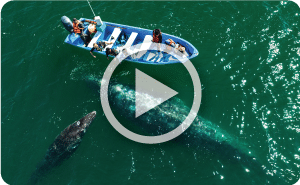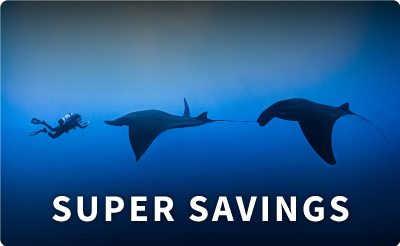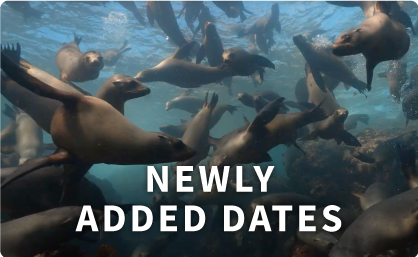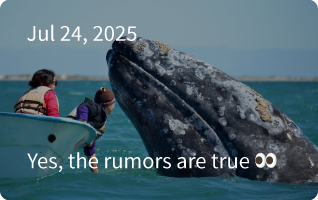Today started off early, for our first dive we had to fight through a bit of surf and swells at San Benedicto island, but it was certainly worth it. Within a minute, a group of Bottlenose Dolphins greeted us, four, including a mother and it’s baby. They were enjoying themselves in the waves. It was a spectacular way to start the day. When they left we were not alone for long, two Chevron Manta Rays came to greet us, they said hello several times, coming back several times. Each of us were able to take our photo’s, they were close enough to touch. When we got enough of the Manta’s we continued on our dive. There was a considerable amount of fish life, including large schools of Big Eye Jacks, Bluefin Trevally, Pacific Creolefish etc… When it was time to start our accent and finish our safety stop, we were greeted again by our two Chevron Manta Rays. They stayed around till the very end of our dive. – Sabrina Woodworth
On our first dive today we were greeted by a friendly pod of dolphins, a mother and half-grown baby made several close passes to check out the funny critters blowing bubbles. The entire second dive was spent being entertained by at least 3 giant mantas. Great all-round so far! Chuck
The Shark Conservation Act has finally become law, giving much-needed protection to some of the ocean’s most magnificent creatures.
Signed by President Obama on January 4, the law closes a major loophole in an existing U.S. ban on shark finning. That gruesome practice involves fishermen cutting off sharks’ fins, which are used in soup, then throwing their still-living bodies into the sea.
An estimated 73 million sharks are killed in this fashion every year. While fishing for them will continue, “I think this means less sharks will be killed,” said Matt Rand, director of global shark conservation at the Pew Environment Group, who helped press Congress for the law.
While shark finning was already supposed to be illegal in U.S. waters, the previous law didn’t apply to boats unequipped with fishing gear. As a result, operators of boats like the infamous King Diamond II — boarded by the Coast Guard in 2002 after a 32-ton load of fins gathered from fishing boats nearly caused it to swamp — were able to ignore the law.
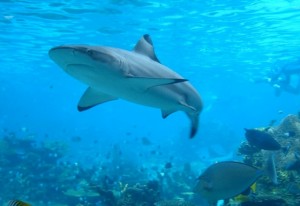
Existing law also focused less on the act of finning than on fishermen’s fin-to-shark weight ratio. This could be gamed by keeping the body of a large-bodied, small-finned shark, and finning several more.
The Shark Conservation Act bans finning of any sort, on any type of vessel, with one exception: North Carolina’s dogfish fishery, a compromise necessary to secure the vote of Senator Richard Burr. That fishery accounts for one percent of all U.S. shark fishing.
“The exemption is not preferred,” said Rand, but “if the world had 99 percent of all shark species caught with fins attached, we’d be much better off.”
Because fishermen will be required to keep the bodies — which, apart from fins, are largely inedible and not valuable — they’ll have less incentive to fish for sharks or keep them when accidentally caught, said Rand.
The act also allows the United States to block seafood imports from countries that permit shark finning. Similar bans helped reduce high-seas driftnet fishing, an extraordinarily destructive practice that was common in the 1970s and 1980s. (Despite pressure, however, some driftnetting still exists.)
Though the act only applies to U.S. boats and waters, it will have global consequences, said Rand. America’s possession of many small Pacific islands, and the 200 miles of water around them, gives it an enormous fishing zone. Its fleet is one of the world’s largest.
For those who consider any shark fishing to be unacceptable — a group that includes not just people sympathetic to animals, but scientists who point to sharks’ crucial, top-predator ecological role (.pdf) — the act is just a first step toward a total ban.
In Hawaii, it’s already illegal to possess or distribute shark fins. Countries like the Maldives and Honduras have outlawed shark fishing. “I hope the U.S. moves in that direction,” said Rand.
credit:: Brandon Kelm, Wired Science

